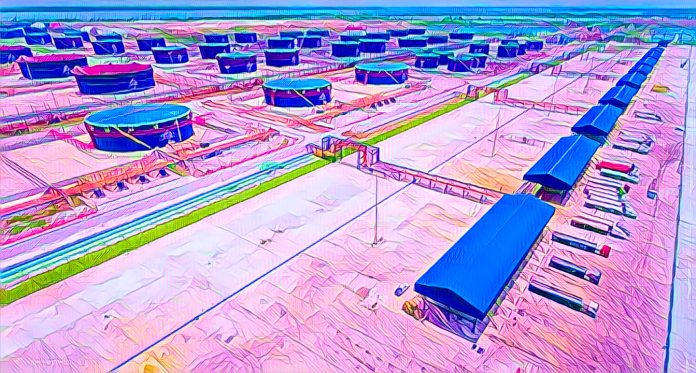The new Dangote Oil Refinery, capable of processing 650,000 barrels per day, is poised to transform Nigeria’s economic landscape by addressing its persistent foreign exchange issues and bolstering the national currency, the Naira. This development was highlighted during a recent visit by S&P Global, an international financial analytics firm, to the refinery site at Ibeju-Lekki, Lagos, as part of its assessment for Nigeria’s sovereign credit rating.
During the visit, which included officials from the Federal Ministry of Finance, Ravi Bhatia, the director and lead analyst at S&P Global Ratings, praised the refinery for its potential to shift Nigeria from a crude exporter to a net exporter of refined petroleum products. This shift is anticipated to significantly enhance revenue generation and reduce the pressure on Nigeria’s foreign exchange reserves.
“It is a very impressive facility, able to process 650,000 barrels a day, when in full capacity. It is the largest single-train refinery complex in the world. Nigeria is a big exporter of crude but has issues with importing refined fuels. So, there is a gap in the market where crude can be refined in Nigeria, save money that way, and potentially save some foreign exchange. This will be positive for the economy in the medium term. It looks positive from our assessment,” Bhatia remarked after a thorough four-hour tour of the facility.
Devakumar Edwin, vice president of Oil and Gas at Dangote Industries Limited (DIL), who led the S&P team during the tour, reiterated the refinery’s role in leveraging Africa’s vast crude oil resources to produce refined products locally. By doing so, the refinery aims to initiate a cycle of industrial development, job creation, and enhanced economic prosperity.
Edwin also announced that the refinery would begin producing premium motor spirit (PMS), commonly known as petrol, this month. He emphasized that the products from the $20 billion facility are of high quality, meet international standards, and are sufficient to meet 100 percent of Nigeria’s demand for petrol, diesel, kerosene, and aviation jet fuel, with excess capacity planned for export.
The refinery, currently operating at 350,000 barrels per day, is expected to increase its capacity to at least 500,000 barrels by July/August, marking the commencement of petrol and ultra-low sulfur diesel refining. Edwin highlighted the refinery’s ability to process a diverse range of crude types from Africa, the Middle East, and the U.S., noting its compliance with Euro V specifications and various international environmental standards.
Proudly, Edwin pointed out that unlike most refineries, which are constructed by foreign companies, the Dangote Refinery was designed, engineered, and built by a Nigerian company acting as its own Engineering, Procurement, and Construction (EPC) contractor. This achievement showcases a significant milestone in Nigeria’s industrial capabilities.
“The refinery can produce the best quality products in the world, Euro V grade. It is one of the energy-efficient refineries and it is highly environmentally friendly. It is sophisticated with a high level of automation. The largest single-train refinery in the world is 100 percent designed, engineered, and constructed by a Nigerian company as EPC contractor,” Edwin proudly stated.
This groundbreaking project is expected to drastically reduce Nigeria’s reliance on imported petroleum products, which has long been a significant economic burden. According to the National Bureau of Statistics, Nigeria spent approximately N12 trillion on the importation of petroleum products in 2023, marking an 18.68 percent increase from the previous year. The operational refinery not only promises to cut down this massive import bill but also positions Nigeria to become a key player in the global oil refining industry.
With its advanced technologies and strategic location, the Dangote Refinery is set to deliver a much-needed boost to Nigeria’s economy, providing a sustainable solution to the country’s forex challenges and contributing to broader economic stability and growth.



